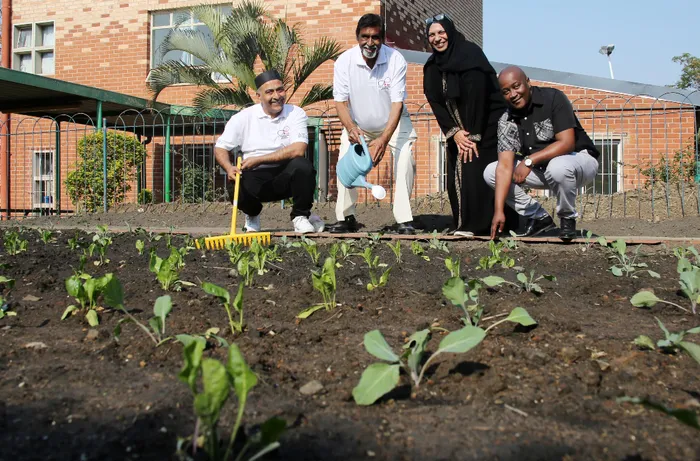Creating sustainable gardens on Mandela Day
Community spirit

Kiba Project Head, Haniff Salat; the President of Kiba, Omie Singh; the head of social work at DCMH, Moonira Khan; and the CEO of DCMH, Mbonisi Sibisi, are proud of the vegetable garden event at the Durban and Coastal Mental Health Organisation in Phoenix.
Image: Pictures: Tumi Pakkies/ Independent Newspapers
IN A REMARKABLE display of community spirit, the KwaZulu-Natal International Business Association (Kiba) dedicated its 67 minutes for Nelson Mandela Day to assist the Durban Coastal and Mental Health (DCMH), a non-profit organisation based in Phoenix.
Over the past two weeks, members of Kiba have rolled up their sleeves to clear large areas of land at DCMH, paving the way for the creation of a vegetable garden and the planting of banana trees. In a symbolic gesture, 1 000 seedlings and 67 banana trees were planted, representing Mandela's 67 years of public service.
The recently cultivated space will soon yield an array of vegetables, including carrots, lettuce, cabbage, and spinach.
The CEO of DCMH, Mbonisi Sibisi, expressed his gratitude to Kiba and its member businesses for their support.
“We are overwhelmed by the support we have received at the centre. It is not always that cooperative organisations partner on board in terms of assisting, but the work that is done here has shown that if we can cooperate and work towards a common goal, it can be achieved,” he said.
Mental health issues affect a significant portion of the South African population, with statistics indicating that 1 in 4 people are expected to experience some form of mental illness in their lifetime. Community mental health organisations face numerous challenges that hinder their ability to assist those in need.
During the handing over ceremony, the head of social work at DCMH, Moonira Khan, said: “Mandela Day reminds us that no matter how big the challenges are, we can all do something to make a difference. We are fortunate to have such wonderful sponsors among us. Your compassion, actions, and willingness to help others make the world a little better than what it was.”
Khan highlighted the financial hurdles faced by the organisation, stating.
“The funding we receive from government departments such as social development and health helps a great deal, but it does not cover the most important, our food, maintenance, and essential services. We are grateful to our sponsors. In my 18 years at DCMH, I have not seen such committed donors.”
Sibisi echoed these sentiments, sharing the joy observed among service users.
“The excitement and sense of purpose we saw on the faces of our service users, who helped transform our grounds into the beautiful vegetable gardens, you see today, express how proud they are and the sense of achievement they feel.”
He continued, referencing Mandela's legacy: “Madiba said we need not mask difficulties; we need to tell the truth as it is. And that is what DCMH is all about. There is wonderful work that the organisation is doing. However, it faces enormous difficulties. What carries us through is subsidies and donations. Some of our service users rely totally on DCMH to take care of their needs. We really rely on the community at large to take care of the most vulnerable in society.”
Sibisi also noted the importance of Kiba's involvement, stating: “When we see Kiba come on board and say 'let us prioritise mental health', it gives us some sort of hope that the big task that faces our country and organisation, that we can survive. The project that you have undertaken will be able to feed us for a number of years to come.
"The garden that you put up there is one that we can make sure is not just an issue for one day. This allows us to be sustainable. The various sponsors built a foundation as part of the building blocks to continue to serve our communities.”
The president of Kiba, Omie Singh, affirmed the organisation's commitment.
“Today, we didn’t just come to speak, we came to act. As part of our contribution, we have already planted 67 banana trees and developed a thriving vegetable garden right here at the centre. These are small but meaningful steps toward food security and sustainability. We are grateful to the many sponsors present here today. This is exactly what Nelson Mandela stood for, the spirit of unity, service, and the unwavering commitment to uplifting our communities, especially the most vulnerable.”
Through these collective efforts, DCMH aims to create a sustainable environment that not only supports its service users but also fosters community well-being, embodying the spirit of Mandela's legacy.